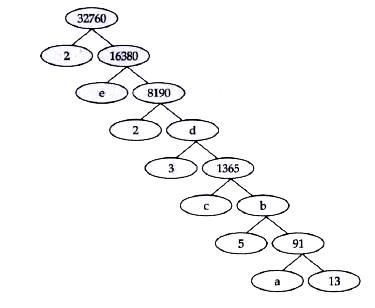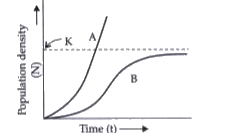Read the following text and answer the following question on the basis of the same :
Growth of population with time shows specific and predictable patters. Two types of growth patter of populaiton are exponetial and logistic growth . When resource in the habitat are unlimited each species has the ability to relize fully its innate potential to grow in number . Then the population gorws in exponential fashion . When the resource are limited growth curve shows an inital slow rate and then it accelerates and finally slows giving the gorwth curve which is sigmoid .
The population growth is generally descibed by the following equations :
dN/dt=rN(K−N)/K
What does 'r' represent in the given equation ?
Population density at time Y.
Intrinsic rate of natural increase
Carrying capacity
The base of natural logarithum
The correct Answer is:B
To answer the question regarding what 'r' represents in the given equation for population growth, we can follow these steps:
1. Understanding the Equation: The equation provided is dNdt=rNK−NK. This equation describes the rate of change of a population over time (dN/dt) in relation to its current size (N) and the carrying capacity (K) of the environment.
2. Identifying the Components:
- dN/dt: This represents the rate of change of the population size over time.
- N: This is the current population size.
- K: This is the carrying capacity of the environment, which is the maximum population size that the environment can sustain.
- r: This is the variable we need to define.
3. Defining 'r': In population ecology, 'r' is known as the intrinsic rate of natural increase. It reflects the potential growth rate of a population under ideal conditions, where resources are abundant, and there are no limiting factors.
4. Conclusion: Therefore, in the context of the equation, 'r' represents the intrinsic rate of natural increase, which is essentially the difference between the birth rate and the death rate of the population.
5. Final Answer: The correct option is b. Intrinsic rate of natural increase.
- dN/dt: This represents the rate of change of the population size over time.
- N: This is the current population size.
- K: This is the carrying capacity of the environment, which is the maximum population size that the environment can sustain.
- r: This is the variable we need to define.
Similar Questions
Read of the following text and answer the following questions on the basis of the same:

Find the value of aView SolutionRead the following text and answer the following question on the basis of the same :
Growth of population with time shows specific and predictable patters. Two types of growth patter of populaiton are exponetial and logistic growth . When resource in the habitat are unlimited each species has the ability to relize fully its innate potential to grow in number . Then the population gorws in exponential fashion . When the resource are limited growth curve shows an inital slow rate and then it accelerates and finally slows giving the gorwth curve which is sigmoid .
Identify the correct equation that represents the exponential population growth curve:View Solution
Knowledge Check
- Question 1 - Select One
Read the following text and answer the following question on the basis of the same :
Growth of population with time shows specific and predictable patters. Two types of growth patter of populaiton are exponetial and logistic growth . When resource in the habitat are unlimited each species has the ability to relize fully its innate potential to grow in number . Then the population gorws in exponential fashion . When the resource are limited growth curve shows an inital slow rate and then it accelerates and finally slows giving the gorwth curve which is sigmoid .
Identify the incorrect statement :AExponential growth occurs is organism such as lemmings .BLogistic growth is more relistic .CExponential growth has two phases lag and log .DIn logistic growth, population passes well beyond the carrying capacity of ecosystem. - Question 2 - Select One
Read the following text and answer the following question on the basis of the same :
Growth of population with time shows specific and predictable patters. Two types of growth patter of populaiton are exponetial and logistic growth . When resource in the habitat are unlimited each species has the ability to relize fully its innate potential to grow in number . Then the population gorws in exponential fashion . When the resource are limited growth curve shows an inital slow rate and then it accelerates and finally slows giving the gorwth curve which is sigmoid .
The equations correctly represents Verhulst-Pearl logistic growth is:AdN/dt=rN(K−N)/KBdN/dt=rN/KCdN/dt=N(K−N)/KDdN/dt=K(K−N)/N - Question 3 - Select One
Read the following text and answer the following question on the basis of the same :
Growth of population with time shows specific and predictable patters. Two types of growth patter of populaiton are exponetial and logistic growth . When resource in the habitat are unlimited each species has the ability to relize fully its innate potential to grow in number . Then the population gorws in exponential fashion . When the resource are limited growth curve shows an inital slow rate and then it accelerates and finally slows giving the gorwth curve which is sigmoid .
Study the population growth curves (A and B) in the given graph and select the incorrect statement :
 ACurve 'A' shows exponential growth represented by equation dN/dt=rNBCurve 'B' shows logistic growth , represented by equation dN/dt=r(K−N)/KCExponential growth curved is considered as more realistic than the logistic growth curveDCurve 'A' can also be represented by equation Nt=N0en
ACurve 'A' shows exponential growth represented by equation dN/dt=rNBCurve 'B' shows logistic growth , represented by equation dN/dt=r(K−N)/KCExponential growth curved is considered as more realistic than the logistic growth curveDCurve 'A' can also be represented by equation Nt=N0en
When resources are unlimited each species has the ability to realise fully its innate potential to grow in number as observed by
View SolutionThe logistic population growth is expressed by the equation
View SolutionThe logistic population growth is expressed by the equation :
View SolutionThe logistic population growth is expressed by the equation
View SolutionThe logistic population growth is expressed by the equation :
View Solution

